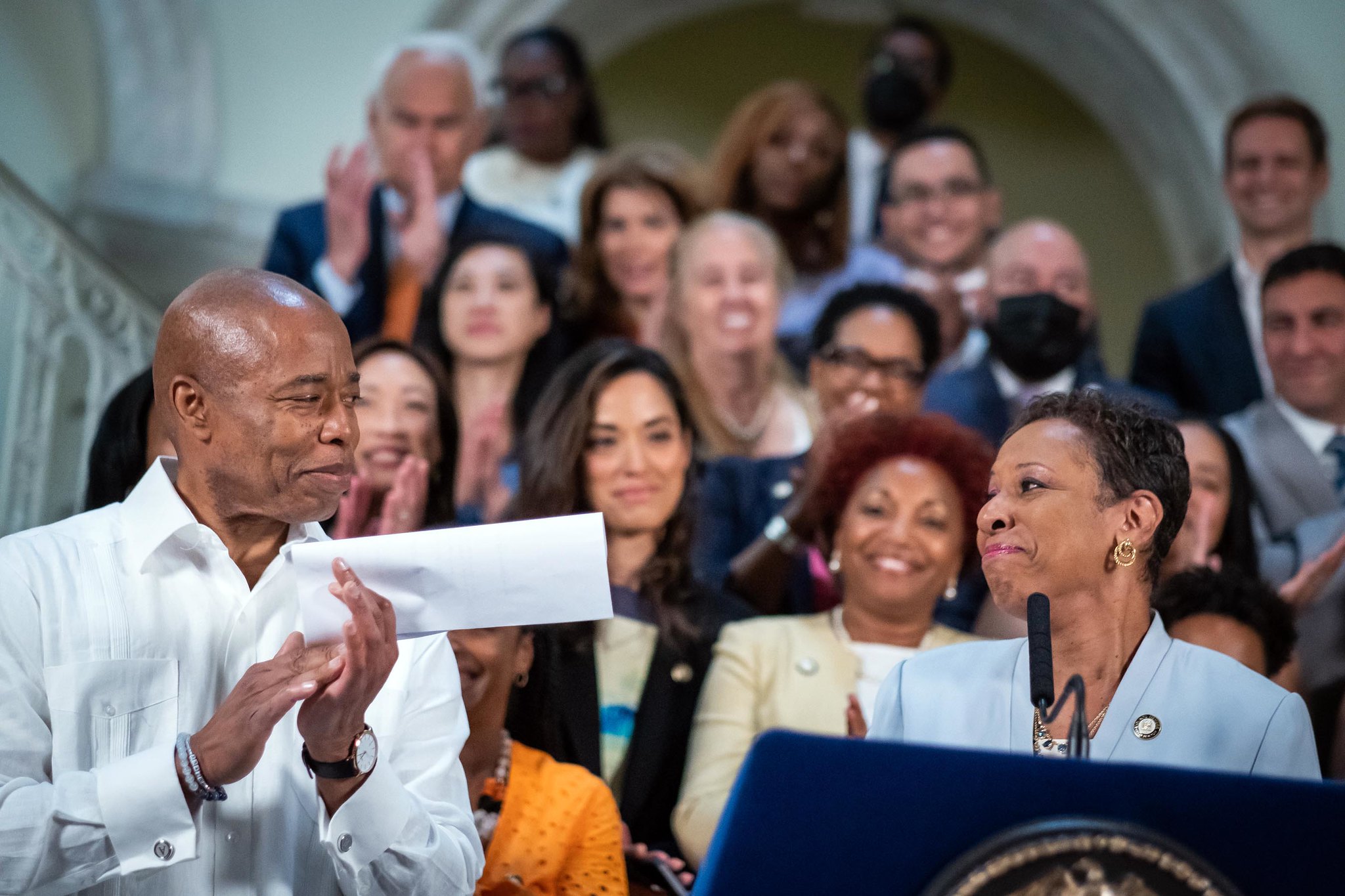This glass is way more than half full.
Livable streets advocates were hailing the budget handshake announced by Mayor Adams and Council Speaker Adrienne Adams on Friday — even though the agreement provided far less for street safety projects than the Council originally sought as budget negotiations got under way earlier this year.
First, the top line: In a post-press conference statement, the Council and mayor said the budget would "tackle the city’s traffic violence crisis" and "advanc[e] the goals" of the legally required Streets Master Plan with $53 million in operating funds for the Department of Transportation in the fiscal year that starts on July 1.
That money is just a down payment on the mayor's promised $904 million in funding for the Streets Master Plan. The breakdown of that is $585 million in capital funding for major projects and the remaining $319 million for day-to-day funding of the agency over the entire Streets Master Plan period, through June 30, 2026.
The annual budget of the Department of Transportation is a bit north of $1 billion, so the $53 million in annual operations funding this year and the $115 million more per year average for capital projects is relatively small.
Indeed, it's far less than the Council originally sought $3.1 billion to double the target goals of the Streets Master Plan, which requires the Adams administration to install 250 miles of protected bike lanes, 150 miles of dedicated bus lanes and create scores of new public plazas.
Interesting news for Streetsblog readers: @NYCSpeakerAdams is touting many initiatives in the budget — parks, human resources, HIV/AIDS services, hate crimes, education, child care, “community safety,” mental health, etc. But not a single word about road violence or Vision Zero. pic.twitter.com/UQ1qEOGnZb
— Streetsblog New York (@StreetsblogNYC) June 10, 2022
Neither Adams nor Adams mentioned street safety initiatives in their lengthy self-congratulatory presser on Friday. The post-presser statement did mention a few more initiatives that are so dear to the livable streets movement:
- $43 million more for parks in FY23.
- A restoration of litter basket servicing above pre-pandemic levels (that's $22 million in FY23).
- A tiny bit more in annual funding for the existing composting program ($20 million in FY23).
- A minuscule amount of cash for "a waste containerization study" and 1,000 more rat-resistant trash cans ($5 million).
A spokesperson for the Council didn't respond to a question about why Speaker Adams settled for less from her Queens high school pal Mayor Adams.
So it felt to advocates to spin the funding — and all were pleased (with some quibbles, natch).
"It would likely be hard for DOT to actually spend the money that the Council called for," said Eric McClure of StreetsPAC. "I think that the budget commitment is quite substantial; it’s a significant amount of funding, and it should allow the city to accomplish the benchmarks laid out in the Streets Plan. The Council's [ask] may have been more symbolic as an indication of the Council’s commitment to safe-streets progress."
Danny Pearlstein of Riders Alliance also cheered the deal.
"This is a high water mark for bus lanes and street safety funding," said Pearlstein (whose group still has problems with how things are run in this town, that's for sure). "[The proposed] budget keeps the promise of funding the Streets Plan."
But all the advocates added that they'll be watching closely as the Streets Master Plan rolls out over the next four-plus years.
"This budget season started off with zero funding committed to the Streets Plan [but now] we are on a strong path toward making streets safer, healthier, and more equitable," said Cory Epstein of Transportation Alternatives. "The next step is ensuring that these overdue investments and much-needed projects are delivered without delay. Our streets are in crisis and we cannot wait for the solutions needed now.”
Pearlstein added that the key will be how Mayor Adams spends the money he's committed.
"Transit riders need Mayor Adams to turn around slow bus service that wastes millions of New Yorkers' precious time," he said. "We demanded and won full funding. Now the proof of the planning is in the implementation."
And Jon Orcutt of Bike New York pointed out that the DOT has still not provided a list of projects or initiatives that will get the windfall.
"I wouldn’t second-guess the budget negotiators," said Orcutt. "I’m more interested in what the $904 million will get us — and I don’t know that answer yet."
And that's why the advocates will be watching.
"If implementation comes up short, we and our fellow advocates, and many supporters in the City Council, will be ready to fight for more," McClure said. "Investing heavily in a compliance officer to ensure that the commitments are made might not be a bad idea."
Sara Lind, policy director at Open Plans (our sister organization) pointed out that "traffic violence is a public health crisis," so "it is imperative that Council members champion projects in their districts and support DOT’s use of these funds to rapidly implement life-saving redesign and infrastructure. When cities invest in better street design, they save lives and make streets livable places for everyone."
After initial publication of this story, DOT said the funding was more than enough to get the job done:
“This historic investment will help DOT advance the goals of the Streets Plan to build a safer, more sustainable city,” said Vin Barone, an agency spokesman. "We will be distributing these funds equitably to ensure underserved communities receive needed transit, public space, and cycling enhancements."
The agency said it has already improved more than half of the 1,000 intersections that Mayor Adams promised, on Jan. 18, to make safer by the end of the year.
City Hall did not get back to us last week. Council Member Selvena Brooks-Powers, chair of the Transportation Committee, did not respond to a request for comment.






